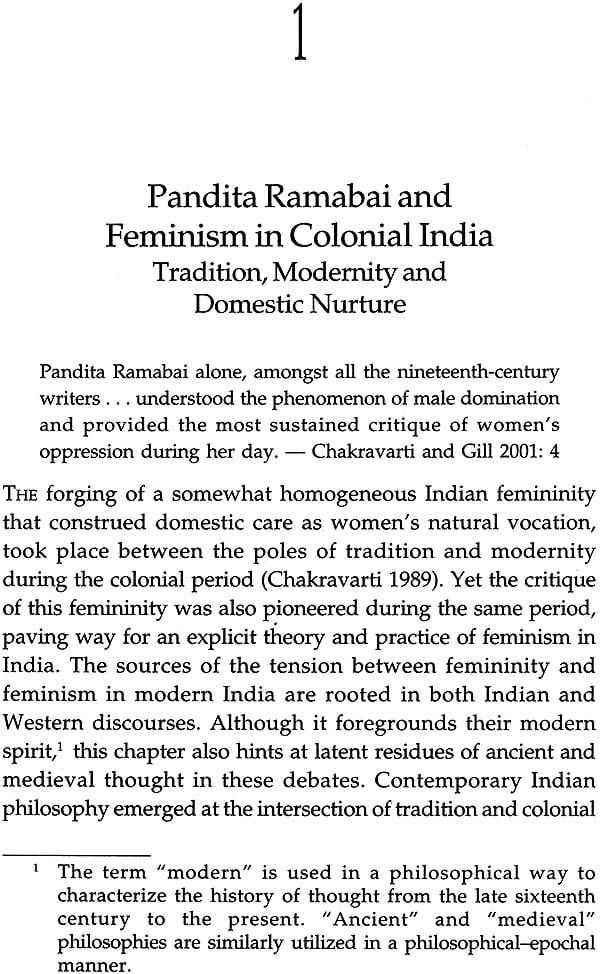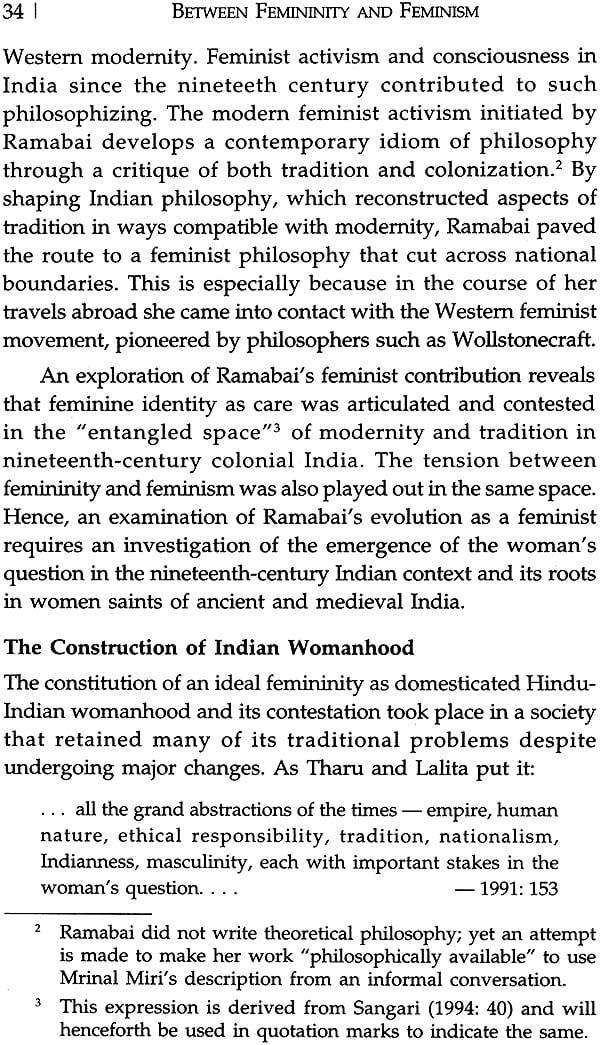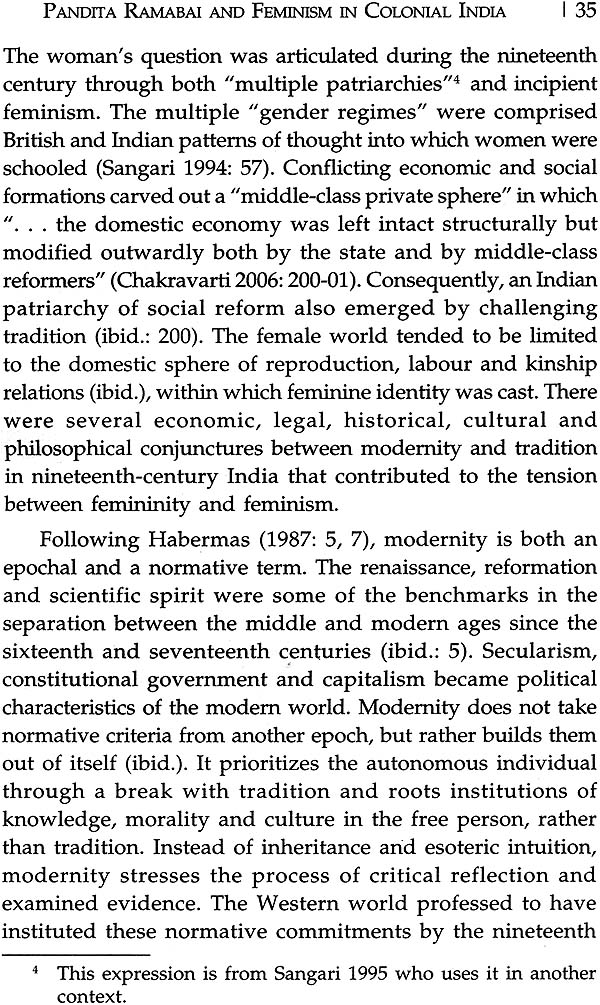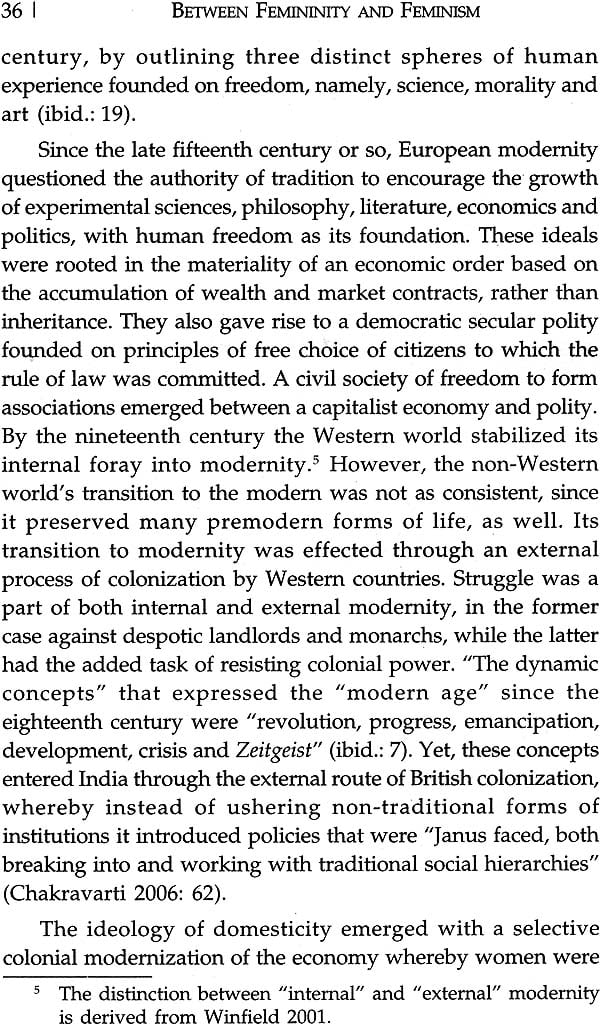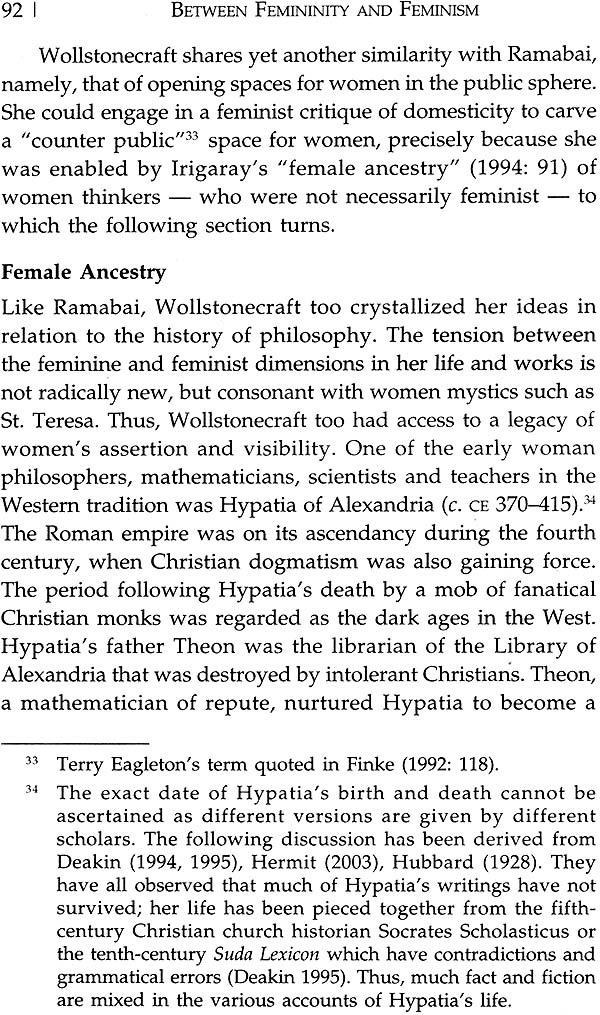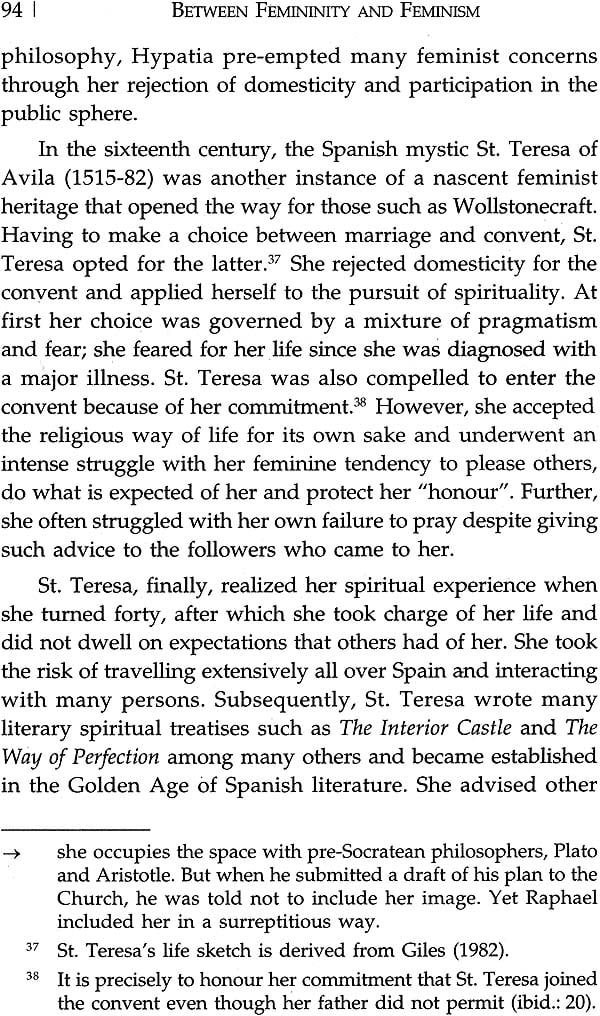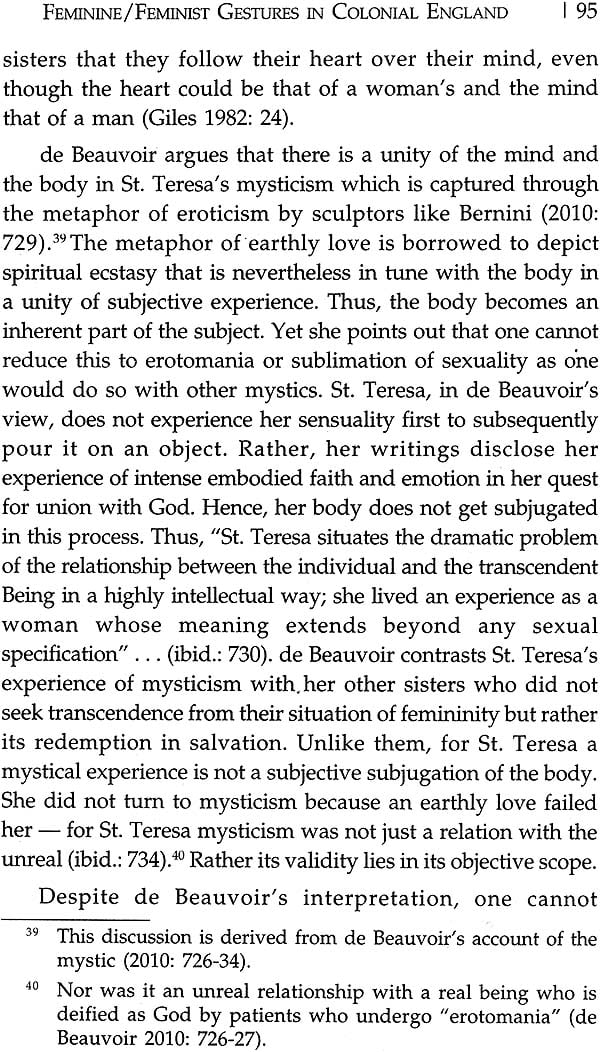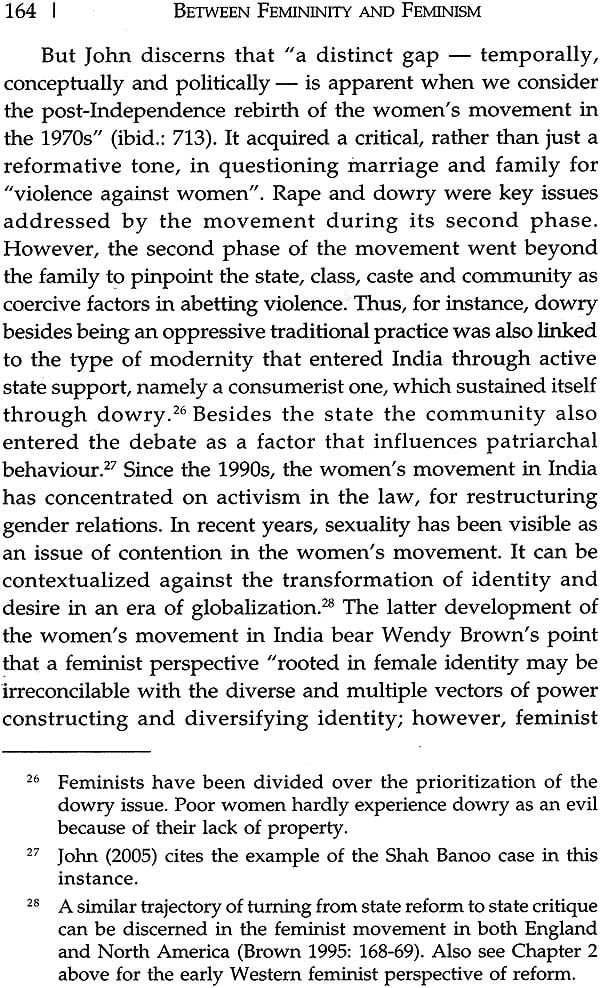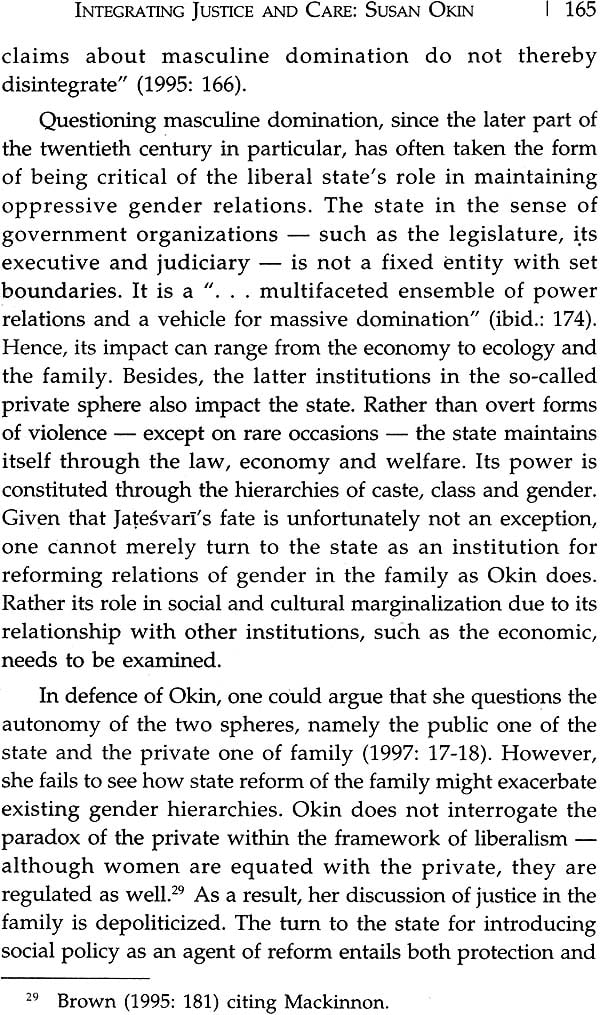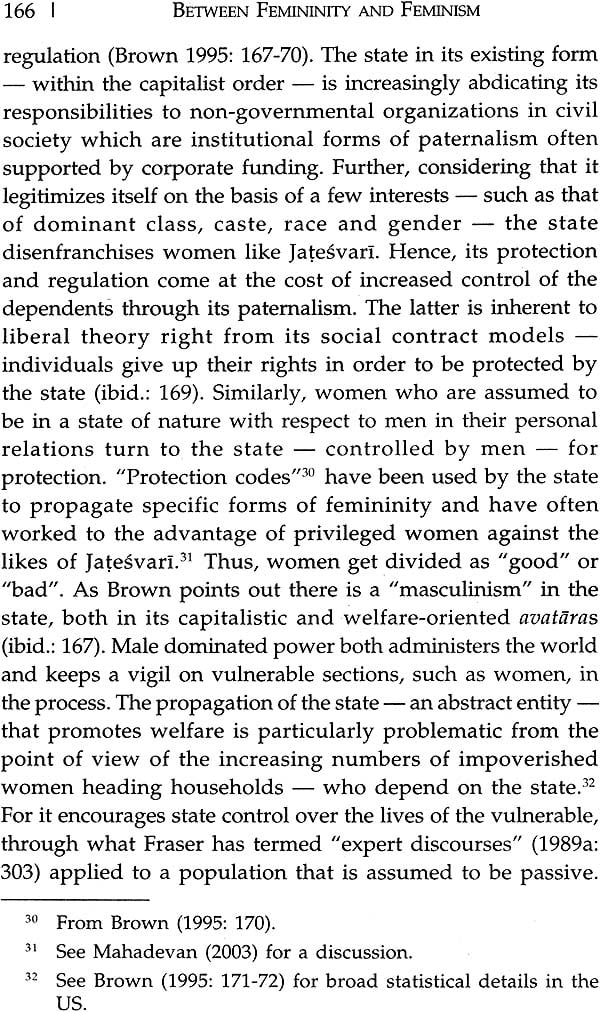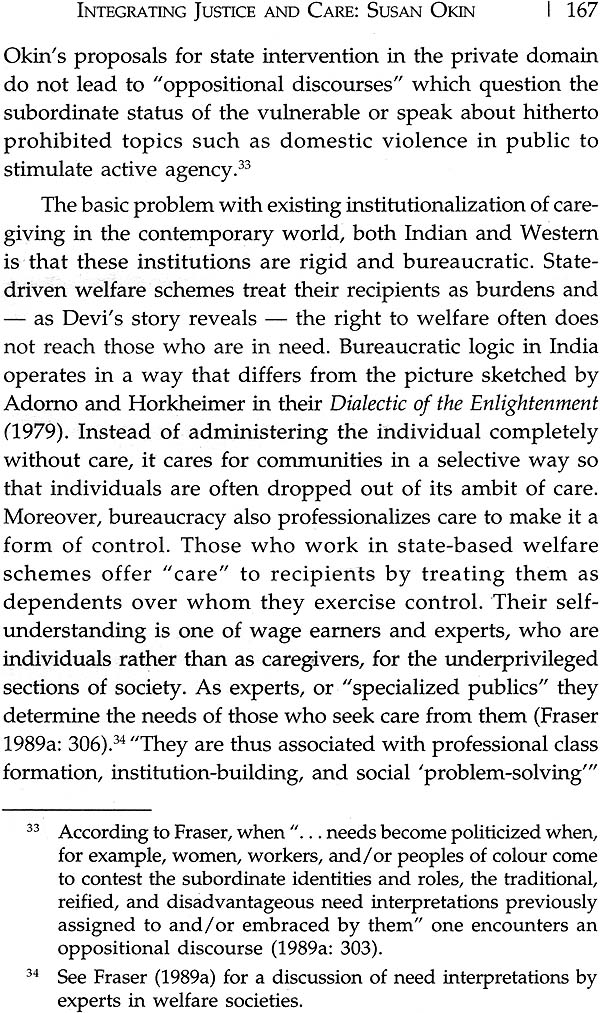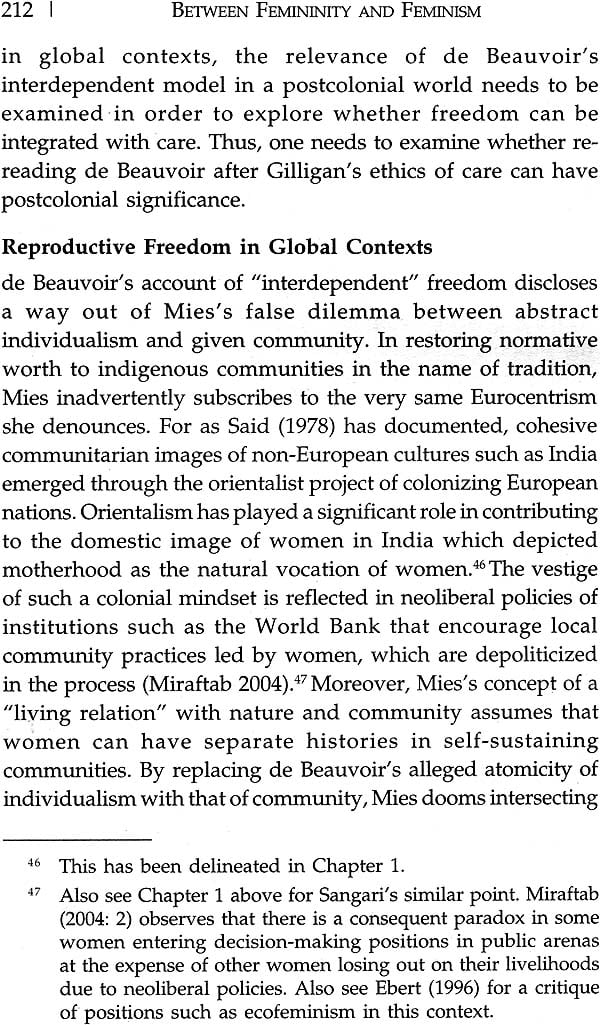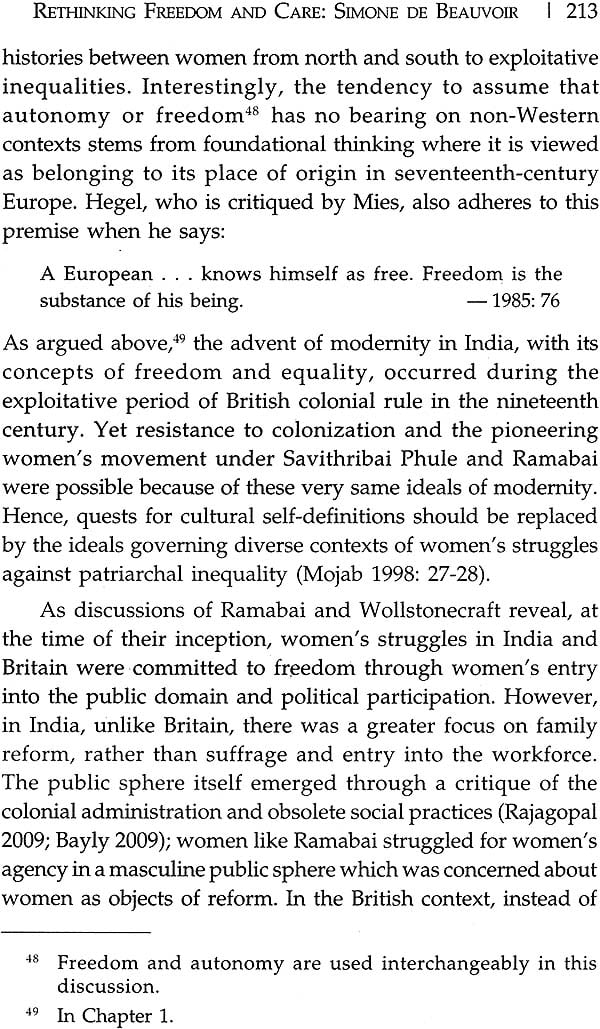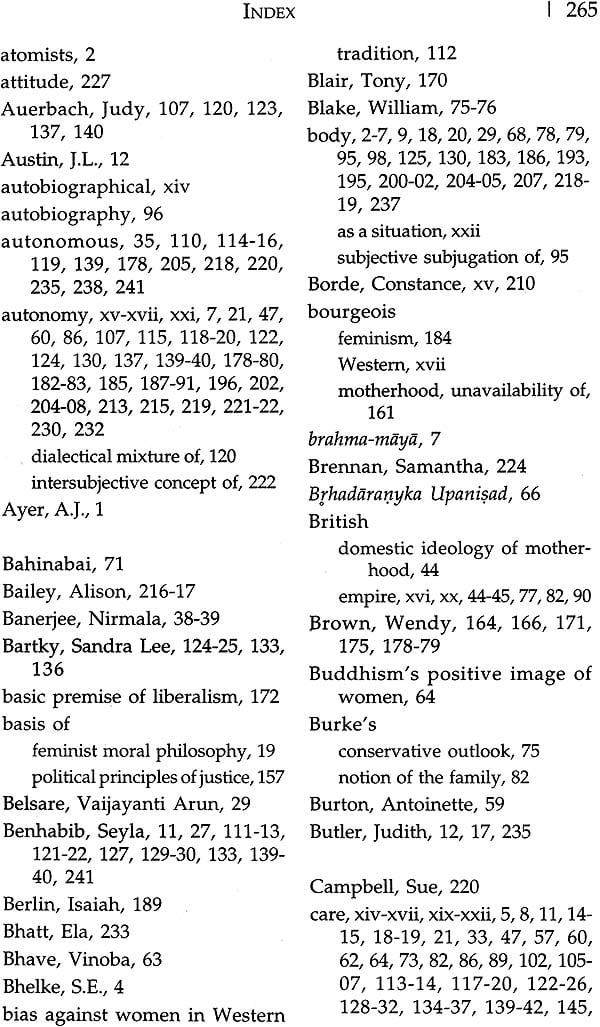
Between Femininity and Feminism (Colonial and Postcolonial Perspectives on Care)
Book Specification
| Item Code: | NAI042 |
| Author: | Kanchan Mahadevan |
| Publisher: | D. K. Printworld Pvt. Ltd. |
| Language: | English |
| Edition: | 2014 |
| ISBN: | 9788124607305 |
| Pages: | 309 |
| Cover: | Hardcover |
| Other Details | 9 inch X 6 inch |
| Weight | 710 gm |
Book Description
Although the feminist debate on the ethics of care has demonstrated that philosophical concepts are gender-laden, the relation of care to justice and autonomy is not self- explanatory. Moreover, given its Western context, the normative relevance of the care debate to non-Western feminisms remains problematic. This book addresses this debate and investigates the extent to which notions of justice and autonomy can be reformulated without Eurocentrism from the perspective of care.
In this endeavour, this book maps the shifts in feminist approaches to care from the colonial to the post-colonial periods, taking both inter- disciplinarity and inter- sectionality into account. The book also argues that the feminist debate on care has contributed towards making philosophy's boundaries with culture and social science more porous.
Kanchana Mahadevan is Professor at the Department of Philosophy, University of Mumbai. Her teaching and research interests in philosophy include ethics, hermeneutics, critical theory, gender studies and political theory. She has published various papers in journals and anthologies on these themes.
THIS volume, Between Femininity and Feminism: Colonial and Postcolonial Perspectives on Care, is an important addition to the growing body of feminist interrogation of mainstream disciplines. Located at the boundaries of Western and Indian philosophical traditions, the volume provides fresh insights into a fundamental dilemma of feminist moral philosophy on the gendering of human identity and the ethics of care. The positing of this dilemma in feminist philosophical traditions can be traced to the rise of feminist activism in the 1970s. Feminist philosophies grew out of the twin compulsions of understanding women's subordination and determining political strategies.
Challenging some of the foundational assumptions of the dominant paradigms that have informed mainstream disciplines, feminist philosophies have sought to interject women's experiences within these theories. By the 1980s these tentative attempts to delineate women's lived experiences within the existing theoretical paradigms soon gave way to criticism of the epistemological traditions of thinking in hierarchical-binary opposition, in terms of the mind-body, nature-culture, reason-feeling and private-public divide (Jaggar and Bordo 1992: 1-10). These epistemological questions challenged the seeming divide in philosophical traditions between the inner self and the external world. They critiqued the tools of articulation, interpretation and analysis that substantiated male standpoint as the norm (Friedman 2000:205-24). To overcome some of the limits to the traditional mind-centred approach to knowledge, feminist theories became increasingly self-reflexive.
This criticism of mainstream theories does not indicate that feminism is not without its own tensions. Like all complex schools of philosophy, feminism too encapsulates diverse viewpoints. Thus, a concern for women's autonomy and independence may lead to the conceptualization of theories in terms that do not recognize human interdependence. Conversely, a concern to stress the capacities of women for caring and empathy with others may lead to the conceptualization of such capacities in terms that offer women little space to meet the needs of the individual self (Grimshaw 1986: 10-15). As Friedman (2000) argues, despite the evidence of a dilemma between moral autonomy and the ethics of care there are certain key principles in feminist ethics. Feminist ethics (as other branches of feminist theoretical engagements) is grounded in a commitment to end oppression, subordination and exploitation of women. Therefore, it has focused on restrictive silhouettes of women's lives (such as marriage and motherhood, as well as discrimination in employment and entitlements) - precisely those areas neglected by traditional debates on ethics.
The Theoretical Frames of the Book The theoretical frames of Between Femininity and Feminism: Colonial and Postcolonial Perspectives are located within these debates in feminist moral philosophy. The broad contours of the debate are triggered by Carol Gilligan's empirical studies on the correlation between gender and ethics. Gilligan suggests that men are characteristically concerned with substantive moral matters of justice, rights, autonomy and individuation, while women are concerned with care and personal relationships. The difference in moral reasoning of men and women implies that men focus on abstract and universalist principles, whereas women are concerned with the immediate and the particular. Gilligan's ideas contributed significantly to the conceptualization of women's selfhood within the ethics of care. Along with many other feminists, defined as radical-cultural feminists, her work emphasized that women's distinct traits and moral reasoning were not necessarily inferior to those of men. The real problem is that society has failed to appreciate women's ethics of care. These revolutionary concepts challenged the prevailing utilitarian and Kantian frames in the 1970s and triggered a search for alternative theory of care ethics, highlighting the moral importance of caring practices. Despite the revolutionary potential for development of an alternative paradigm on the ethics of care, there were voices of protest against such a conceptualization of women's ethics: for an ethics of care based on women's experiences as a primary caregiver in the family could reify prevailing differences of gender.
THE steady and diverse feminist intervention in the philosophical canon has posed provocative questions regarding the status of philosophical concepts and language. Can gender- neutral concepts convey women's experiences? Should they, instead, be replaced by a womancentric vocabulary? Is the use of male pronouns as indicative of all human beings responsible for the discriminatory treatment of women? What is the relation between language and thought? Following Moira Gatens, classification, feminist philosophers such as Mary Wollstonecraft, Susan Moller Okin and Simone de Beauvoir have intervened in the male philosophical tradition of Jean Jacques Rousseau, Thomas Paine, John Rawls and Jean Paul Sartre, from the point of view of women's experiences (Gatens 1991: 90). However, they saw feminist philosophy as accommodating women's themes within the existing philosophical vocabulary of reason, rights, freedom and justice. Indeed, Wollstonecraft and de Beauvoir even used the mainstream male-specific language as a universal referent while writing about women. Alternatively, philosophers such as Carol Gilligan argued for a distinct feminist philosophical vocabulary based on feminine embodiment, feeling, family and relationships, emerging from women's lives. Difference, according to this view, is the only way to remedy the patriarchal bias of concepts. This book engages with the contribution of these feminist thinkers to examine their transformation of the activity of philosophy itself in the course of its contact with the feminine. It does so by exploring the tension between their feminist ideals and feminine virtues. It also endeavours to show how feminist philosophy brings about a greater awareness of philosophy's relation to history, culture and other disciplines. Consequently, feminist philosophy cannot but help be an interdisciplinary activity inscribed within the social dimension. Further, its interdisciplinary also opens up an intersectionality, where Western and non-Western philosophical debates and responses overlap. Hence, this book also interrogates the relevance of Western feminist thought to non-Western contexts.
The struggle between femininity and feminism in the philosophical corpus of feminist thinkers such as Ramabai, Wollstonecraft, Gilligan, Okin and de Beauvoir is examined with reference to the concept of care. This book takes pioneering feminism during the colonial period as its starting point, and moves to its second wave during the postcolonial period to examine the trajectory of the concept of care. There are several reasons for choosing these periods to discuss feminist philosophy. Feminist consciousness itself is reflected through women writing critically about patriarchy and politics, during these periods. Further, the intersection between Western feminism and non-Western contexts can be explicitly discerned during the periods of pioneering feminism and the second wave. The former with its overlap between life and writing, and the latter's overtly theoretical concerns are diverse ways of engaging with philosophy from the perspective of "lived experience".' By inserting their activist autobiographies in philosophical reflection, pioneering feminists opened the possibility of theorizing the concept "woman". Although second wave feminists do not adopt an explicitly activist or autobiographical mode, by adopting the term "woman" in their theorization, they subscribe to intersection between the personal the philosophical. The latter intersection is explicitly theoretical, although it emerges from years of activism. Since the domain of lived experience is heterogeneous, both pioneering and second wave feminist thought have contemporary relevance.
Women, whether Western or non-Western, do not form a homogeneous category. Hence, this book explores the extent to which Ramabai, Wollstonecraft, Gilligan, Okin and de Beauvoir can dialogue with contemporary women. The relationship between these thinkers and their arguments, which is not viewed from a chronological point of view, is conceptually connected. Hence, although de Beauvoir initiated the second wave in the late 1940s, this book engages with her writing towards the conclusion. This is because there has been a proliferation of scholarship on de Beauvoir in recent years, subsequent to the lessons that have been learnt from Gilligan and Okin (Moi 2005; Deutscher 2008). This scholarship also suggests that de Beauvoir, despite her avowals, does not merely apply Sartre's philosophical concepts to women. Moreover, some of the problems with de Beauvoir's position have been attributed to the inadequate translation of her Second Sex by H.M. Parshley in 1953, which consisted of several deletions from and misinterpretations of the original French text (Moi 2002; Glazer 2004). The much awaited new translation by Constance Borde and Sheila Malovany-Chevallier that was published in 2009, opens the possibility of reading de Beauvoir's views on feminine care in ways that could integrate them with autonomy and freedom.
In the course of exploring the arguments of key women philosophers, this book addresses questions such as: What is meant by femininity? Can one define the feminine at all? Can an appeal to the feminine be a feminist gesture? How does the feminist feminine differ from the patriarchal feminine? Can male philosophical frameworks be employed in feminist directions? Can the feminist appropriation of the feminine be reconciled with moral and political values that have been traditionally perceived as masculine, such as justice and autonomy? What is the place of Western feminism in global contexts?
While grappling with the above set of questions, this book investigates the shifts from colonial to postcolonial periods in the feminist approaches to care. Thus, it argues that despite the diversity of their locations the pioneering feminists, Ramabai in the nineteenth-century colonized India, and Wollstonecraft in the colonizing England of the eighteenth century, denounced femininity and care, in spite of which they invoked it in their arguments for gender equality. This is because they responded to the elaborate construction of the feminine as domestic, in which the British empire's interpretation of care as sympathy and an antagonistic Indian nationalism had their stake during the colonial period. Hence, at the incipient stage of the movement, feminists distanced themselves from care and its related meanings given the patronizing undertones that it carried in terms of empire and nationalism. In contrast, the postcolonial shift towards theory in the twentieth century saw feminine care being introduced by Gilligan as a critical concept, against the lacunae in traditional moral philosophy. The articulation of care through Gilligan's feminist lens differs from care in Ramabai's and Wollstonecraft's prefeminist phases or in their feminist defence of motherhood. Gilligan advocates the feminine virtue of care in a non-patriarchal and postcolonial context, unlike the patriarchal and colonial inflections that were later critiqued by Ramabai and Wollstonecraft during their feminist periods.
This book also investigates the possibility of integrating Gilligan's feminine care with the political concepts of justice and autonomy following Okin. Further, since Okin does not adequately dwell on the central concept of freedom, this book returns to de Beauvoir in a postcolonial context to explore the extent to which her notion of autonomy and freedom can accommodate care. This return is also an endeavour to address the theoretical relationship between Western and Indian feminism, in the light of the criticism made by Maria Mies that the bourgeois Western context of de Beauvoir's autonomy, makes it exploitative of Indian women. Thus, this book explores the debate on care and autonomy both from the perspective of feminism's internal debate and from the international point of view of privilege among women in a globalized world. This book adopts an added task of intervening in the conceptual categories of Western feminism in an attempt to blur the strict binary between Indian and Western traditions. It argues that such a binary is not feasible in the Indian context because feminist consciousness was explicitly articulated through Ramabai at the interface of Indian nationalism and British colonization, introducing Western concepts to Indian feminism. Moreover, in recent times Mies's critique has opened up the debate regarding Western feminism's hierarchical relation with local feminisms such as those in India. Through an examination of the conceptual schemes of Western feminism in the Indian context, this book hopes to democratize the theoretical terrain of feminist philosophy.
ALTHOUGH feminist philosophers have situated philosophical concepts in contexts of gendered history for several decades now, this relation has not received enough attention to make it a part of the mainstream philosophical corpus. Across continua of epistemology, metaphysics, ethics and the like, those with an inclination to canonical philosophy treat the gendered roots of concepts as debatable and for most part as a non-issue. Arguing that philosophical concepts are historical and gender-neutral, they envisage the traditional task of philosophy as one of either a non-sensuous contemplation of an ultimate reality, or of a sensuous apprehension of facts, both of which emphasize vision. These preoccupations explain why a cursory glance at some of the positions in ancient and modem philosophy would reveal the absence of any relation between women and philosophy. Vision as a foundation of objective distance (between the knower and the known) and clarity are commonly affirmed as central to knowledge in both Western and Indian philosophy. Despite their epochal differences, Plato's ancient Greek perspective and Rene Descartes's modern approach are united in upholding attributes that depend on embodied and changing sense- perceptions to be misleading; they treat as essential, qualities that are accessible to the mind's eye. In keeping with this approach, Plato for instance claims:
Descartes differs from Plato in not disparaging the body as sin and takes it as an ontologically relevant category in the spirit of modem science. He takes the body seriously but only as an extended substance - res extensa - that can be measured and thus he intellectualizes it (Descartes 1951a: 88). For Descartes the philosopher who cultivates a calm mind that is not clouded by passions or emotions can see the essential properties of both soul and body clearly and distinctly with a rational eye (ibid.: 81-82). The Indian tradition analogously terms the classical systems of philosophy as darsana (Joshi 2004: 1; Kelkar 2003: 101), which" ... not only implies knowledge but direct experience of reality" but is also separated from the body (Kelkar 2003: 103).
The celebration of vision, admonition of bodily change and immortality of the soul are recurrent themes that provide the foundation for traditional conceptions of moral philosophy. Thus, Plato's ethics delineates the virtues of courage, temperance, wisdom, justice and piety as unified by their genus good (1987b: 329d, 330ab). For him, virtues comprise performance of one's function in accordance with the three parts of the soul (the appetites, the spirits and reason), where the body has no role to play. It is through virtuous activity - of the soul - that an individual from the empirical world can attain the good, which is the telos of human activity in the world of forms (1987d: 353). Plato's dialogue Charmides discusses wisdom and temperance as virtues of the soul (1987a: 175e), while his Republic treats justice, as a disembodied activity that is valuable for its own sake and for its end in the good (1987d: 358). Thus, justice for him also has the task of preserving the order of the soul (upon which the world is modelled) and attaining the good. Plato's good is a goal in the world of forms, outside the domain of empirical experience and the body. Amongst the moderns, Immanuel Kant upheld the singular individual's freedom from bodily passions or what he terms as the "material" conditions of sensory "feeling" as the condition for the pursuit of duty (Kant 1956, §3). In a similar vein, in the context of Indian traditions such as Buddhism, Jainism and Yoga, moral action results when there is separation from bodily attachment. One could keep adding to these examples which found morality on the metaphysics of disembodiment and epistemology of vision.
| Foreword -Veena Poonacha | vii | |
| Preface | xiii | |
| Acknowledgement | xxv | |
| Introduction: Philosophizing as Women | 1 | |
| Part 1 | ||
| Colonial Perspectives | ||
| 1 | Pandita Ramabai and Feminism in Colonial India: Tradition, Modernity and Domestic Nurture | 33 |
| The Construction of Indian Womanhood | 34 | |
| Ramabai's Feminist Voice | 51 | |
| Women in Indian Philosophy | 63 | |
| 2 | Feminine/Feminist Gestures in Colonial England: Mary Wollstonecraft | 73 |
| British Radicalism, Critique of Empire and Female Manners | 74 | |
| Intersecting Spaces: "Entangled" and "Embattled" | 83 | |
| Female Ancestry | 92 | |
| Part 2 | ||
| Postconial Contexts, Persectives | ||
| 3 | The Ethics of Care : Carol Gilligan | 105 |
| Critique of Mainstream Ethics | 107 | |
| The Perspective of Care | 118 | |
| Care in Patriarchal and Conial Contexts | 123 | |
| 4 | Integrating Justice and Care: Susan Okin | 142 |
| Justice and Family : Critique of Rawls | 143 | |
| A Feminist Reinterpretation of Rawls | 147 | |
| Gender Justice : Liberalism and the Family | 153 | |
| 5 | Rethinking Freedom and Care: Simone de Beauvoir | 180 |
| The Disquietitudes of Individualist Freedom | 182 | |
| Relational Freedom, Embodied Situation and Ambiguity | 192 | |
| Reproductive Freedom in Global Contexts | 212 | |
| Afterword: Towards Global Feminisms | 223 | |
| Bibliography | 242 | |
| Index | 264 |
